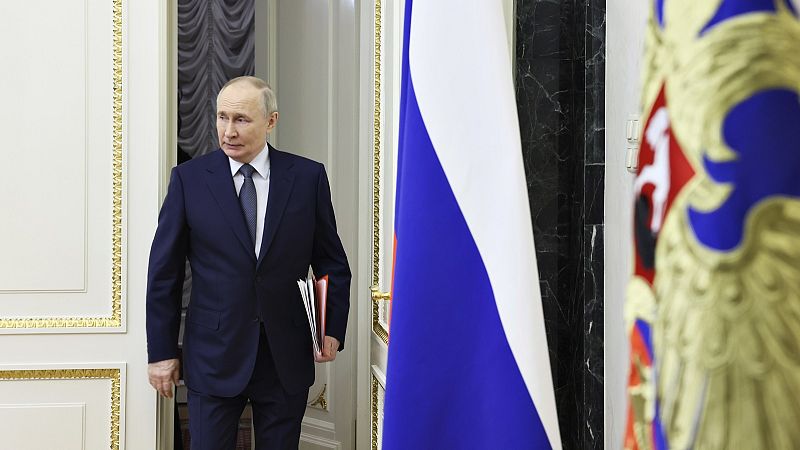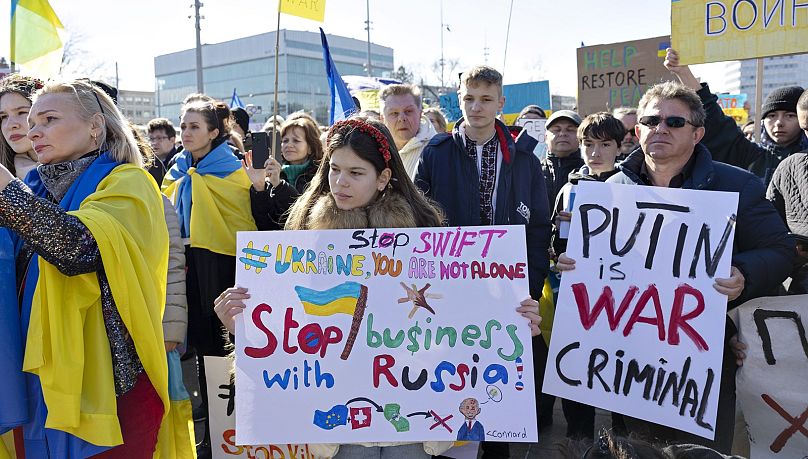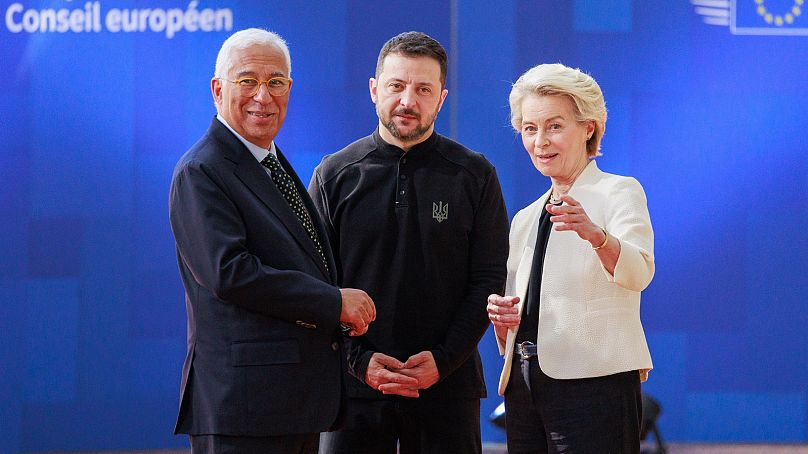
US Secretary of State Marco Rubio has spent recent weeks telling Europeans, vexed at their exclusion from the ongoing negotiations to end Russia's war on Ukraine, that they would be invited to the table when the time came to discuss the future of sanctions.
That invitation might arrive sooner than Brussels had expected.
After a new round of talks in Saudi Arabia, the US announced that Russia and Ukraine had committed to implementing a partial ceasefire on "energy facilities", falling well short of the broad ceasefire that Donald Trump had pushed for.
The parties also agreed to "ensure safe navigation, eliminate the use of force, and prevent the use of commercial vessels for military purposes in the Black Sea," according to the US readout.
Separate read-outs published by the White House listed the main points of the agreement in broad terms, without any footnotes or technical details.
But Moscow was quick to spell out its list of demands.
In its own read-out, the Kremlin added five paragraphs of conditions to be met before the so-called "Black Sea Initiative" is restored. The conditions call for lifting "sanctions" and "restrictions" that Russia says are constraining its exports of food products and fertilisers worldwide, including on agricultural machinery and insurance for cargoes.
The most notable demand is for the Russian Agricultural Bank, also known as Rosselkhozbank, and "other financial organisations" involved in the agricultural trade to be reconnected to SWIFT, a high-security system for rapid money transfers.
Founded in 1973, SWIFT is today considered the most widely-used system of its kind, linking more than 11,000 institutions across more than 200 countries. Nearly 50 million financial messages are sent through the software every day.
This is where the EU comes into play: SWIFT is a cooperative headquartered in La Hulpe, Belgium, and therefore subject to EU law and, crucially, EU sanctions.
A rallying cry
Until 24 February 2022, SWIFT remained largely in obscurity except to those in the financial sector. But after Russian tanks rolled into Ukraine, the name was overnight propelled to international prominence.
The government of Kyiv soon began calling for Russian banks to be kicked out of SWIFT, or de-SWIFT-ed, to curtail Moscow's ability to finance its war machine. The acronym was plastered across banners and placards of protests, piling pressure on politicians to act.
The EU replied on 2 March 2022, when it decided to expel seven Russian banks from SWIFT. The move made international headlines and was celebrated as taboo-breaking.
Months later, in June, the EU agreed to de-SWIFT another three banks: Sberbank (which is Russia's largest), Credit Bank of Moscow and Rosselkhozbank.
"These banks are critical for the Russian financial system and Putin's ability to further wage war. It will solidify the isolation of the Russian financial sector from the global system," the European Commission said back then, explaining the decision.

Rosselkhozbank is a state-owned bank that provides a wide range of financial services and products to agri-food companies, which bring an essential source of revenue for Moscow through global sales of commodities such as wheat, barley and corn.
While the EU never sanctioned Russia's agricultural exports, opting instead for steep tariffs, the sanctions on Rosselkhozbank erected obstacles in the payments between exporters and importers and triggered the Kremlin's anger, leading to the collapse of the Black Sea Initiative originally promoted by Turkey and the United Nations.
This explains why Vladimir Putin, confident in having Trump's ear, has seized the opportunity to ask, once again, for Rosselkhozbank to be re-connected to SWIFT.
The White House's readout did not echo the condition, at least not explicitly. It simply said the US would help Russia restore its "access to the world market for agricultural and fertiliser exports, lower maritime insurance costs, and enhance access to ports and payment systems for such transactions."
The last part – "payment systems for such transactions" – could refer to SWIFT. The decision, though, is not for Trump to make, as SWIFT falls under EU jurisdiction.
Asked to clarify the read-out, the US Department of State declined to comment.
Speaking to reporters, Trump said his team would "be looking" at the conditions put forward by the Kremlin. "We are thinking about all of them right now. There are about five or six conditions. We're looking at all of them," he said.
A tough choice
Putin's demands put the EU in a bind.
If the bloc rejects the call, it risks enraging Trump, who is keen on securing a ceasefire, even if partially, to advance his diplomatic push. If, on the other hand, the bloc approves the call and grants sanctions relief, it risks appearing soft and amenable, an attitude that Moscow could easily exploit to press for further concessions.
Sanctions relief would also run counter to the position of President Volodymyr Zelenskyy, who insists the hard-hitting restrictions be maintained as long as the war rages on.
"There must also be clear pressure and strong action from the world on Russia – more pressure, more sanctions from the United States – to stop Russian strikes," Zelenskyy said on Wednesday in a social media post about the latest wave of Russian drone strikes.
The European Commission did not immediately reply to a request for comment.
During a visit to Kyiv to mark the war's third anniversary, President Ursula von der Leyen said that the bloc would only start rolling back sanctions after seeing Moscow take "concrete steps" towards a lasting resolution.
"What we see is that the sanctions already have a massive effect on the Russian economy," von der Leyen said, citing "skyrocketing inflation" and "spiralling interest rates."
Appetite for sanctions relief is low among diplomats, who point to Russia's continued attacks against Ukraine as evidence that Putin is not serious about peace. The sanctions regime has been painstakingly built across a record-breaking 16 packages. Undoing such a complex structure with the stroke of a pen is not taken lightly in Brussels.

Ahead of a summit in Paris, the Élysée Palace said the question around sanctions was "certainly not" about lifting them but tightening them if Russia failed to agree to the unconditional ceasefire that Ukraine has accepted in its talks with the US.
"Of course, the Russians can always opportunistically link partial progress towards a ceasefire to the lifting of certain sanctions," the Élysée Palace said. "But for us, as long as Russia has not stopped the war because a peace settlement has not been reached, guarantees have not been given to Ukraine and war reparations have not been paid, sanctions will always remain a necessary instrument for us to exert pressure on Russia."
Still, the question is now on the table and might prove hard to ignore.
Under EU rules, sanctions need to be renewed every six months by unanimity, meaning a single member state can derail the delicate process. Since Trump's inauguration, Hungary, a long-time critic of sanctions, has twice threatened to block the rollover and could do so again when the sectorial restrictions are up for debate on 31 July.
"The last EU sanctions on individuals were maintained because (Marco) Rubio pressured Hungary to keep the measures in place. If there is no such pressure, the EU sanctions regime is in great danger," said Maria Shagina, a senior fellow at the International Institute for Strategic Studies (IISS).
Although EU approval would be required to bring Rosselkhozbank fully back into SWIFT, the US might choose, as an alternative, to sed a "signal" that those making transactions with the bank would be spared from legal consequences, Shagina explained.
Jan Dunin-Wasowicz, a partner at Bennink Dunin-Wasowicz who advises on compliance with economic sanctions, said Russia's SWIFT request appeared designed to test Washington and Brussels at the same time.
"Whether that specific demand has been made to the EU is precisely the issue. It does not appear that the EU is part of that discussion for now," Dunin-Wasowicz told Euronews.
"The request to the Trump administration could be an attempt to leverage the US to pressure the EU into easing EU measures. It may ultimately be testing the EU's resolve to stay the course and continue its sanctions policy."







